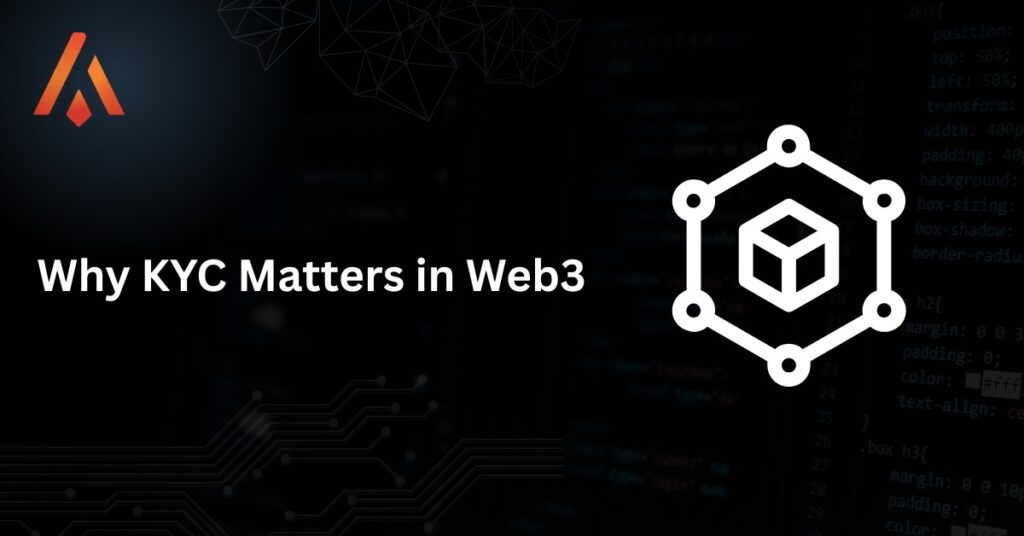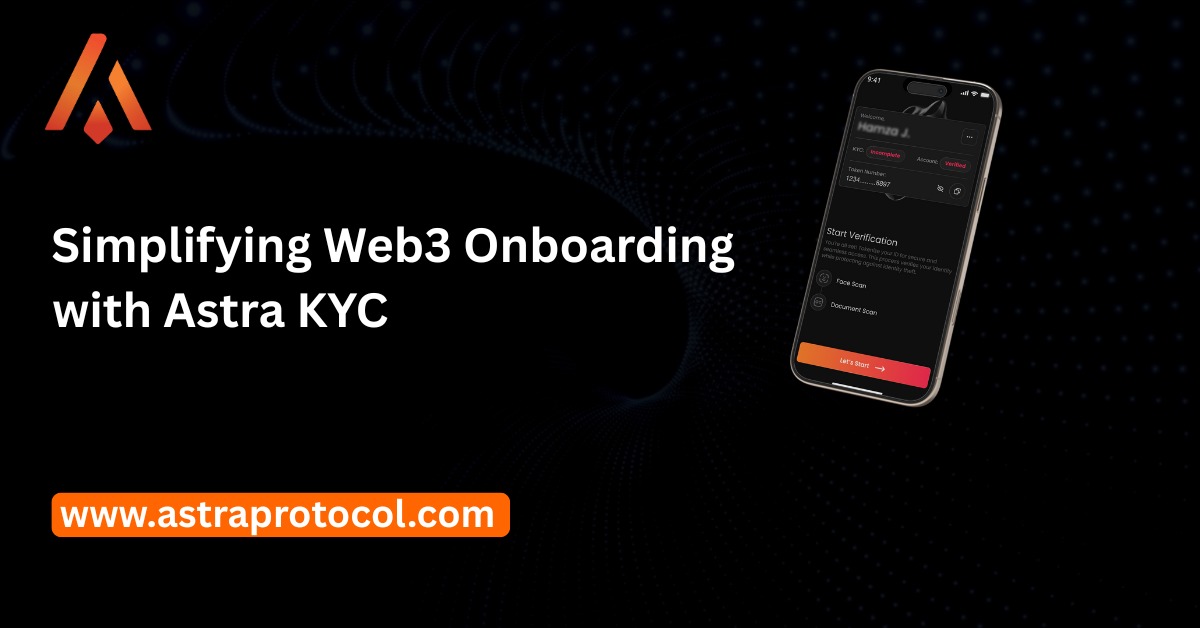In the rapidly evolving world of decentralized technologies user onboarding remains one of the most pressing challenges for Web3 platforms. As blockchain and decentralized applications (dApps) gain popularity a key barrier to mass adoption lies in simplifying the first interaction getting new users onboarded without compromising on trust compliance or security.
This is where Astra KYC steps in providing a seamless compliant and secure onboarding solution that empowers users while meeting the highest standards of regulatory adherence. Astra KYC is revolutionizing how users verify their identity in Web3 ecosystems by combining AI-powered security with blockchain-native integrations. It’s not just about verifying who you are, it’s about doing so in a way that respects privacy, promotes decentralization and supports user sovereignty.
Let’s explore how Astra KYC is transforming the Web3 onboarding experience.
Why KYC Matters in Web3

While Web3 is rooted in decentralization and pseudonymity, certain use cases such as DeFi platforms, NFT marketplaces, decentralized ID systems, and DAOs require compliance with Know Your Customer (KYC) and Anti-Money Laundering (AML) regulations.
Regulatory authorities across the globe are tightening their scrutiny on crypto and blockchain-based services. Without a secure and compliant identity verification layer platforms run the risk of legal consequences fraud or network abuse. However introducing KYC in the decentralized world introduces tension: how can platforms maintain user autonomy while enforcing identity standards?
The answer lies in frictionless privacy-preserving KYC and Astra KYC delivers exactly that.
Astra KYC: The Future of Decentralized Identity Verification
Astra KYC is designed specifically for the Web3 ecosystem. It simplifies the identity verification process without sacrificing speed security or user privacy. Here’s a breakdown of how Astra KYC works and why it’s a game-changer.
1. Instant Verification
Astra KYC dramatically reduces friction in the sign-up process. Traditional KYC can take hours—or even days—to complete. With Astra users can verify their identity in minutes using just their email, government-issued ID, and a biometric scan.
The system performs secure email verification during onboarding to link a verified contact channel to the user’s identity. This fast-track approach eliminates unnecessary paperwork and manual approvals making it ideal for dApps wallets exchanges and NFT platforms looking to scale globally.
2. AI-Powered Biometric & Document Scanning
What sets Astra KYC apart is its AI-driven verification engine. Users are prompted to scan their government-issued ID and perform a quick selfie or video verification. The AI checks for liveness (to ensure it’s a real person) validates the document’s authenticity, and cross-verifies the data for consistency.
This layered security ensures:
- Real users are onboarded (no bots or fraudsters)
- Fake or tampered documents are automatically flagged
- The entire process complies with global KYC/AML standards
By automating and streamlining these steps, Astra not only reduces operational burden but also improves the user experience significantly.
3. Wallet Integration for Web3 Access
Web3 users interact with the ecosystem primarily through crypto wallets like MetaMask, Trust Wallet, Coinbase Wallet, and others. Astra KYC is built with seamless wallet integration, allowing users to link their verified identity to their wallet addresses.
Once verified, users can:
- Sign into dApps securely using wallet signatures
- Access gated features or token sales requiring verified identities
- Interact with DeFi protocols or DAOs with reduced friction
This ensures that users retain their crypto-native behavior—connecting via wallet—while still meeting compliance needs.
4. Tokenized Identity on the Blockchain
Perhaps the most innovative feature of Astra KYC is tokenized identity. After a successful verification, users receive a tokenized proof of KYC—an on-chain representation of their verified status.
This decentralized identity token:
- Is non-transferable (soulbound), preserving individual uniqueness
- Can be used across multiple dApps as a reusable identity credential
- Does not expose private data—instead, it proves that verification has occurred
This approach respects user privacy while enabling interoperability across the Web3 ecosystem. A user can verify once and access hundreds of platforms without repeating the KYC process.
Benefits for Users and Platforms
For Users
- Fast Onboarding: Instant KYC within minutes, no long forms or wait times
- Data Privacy: Personal information is encrypted and never shared without consent
- Control & Portability: Reuse your tokenized identity across multiple Web3 platforms
- Secure Wallet Linking: Access services through your crypto wallet with verified credentials
For Platforms
- Global Compliance: Meet regulatory requirements across jurisdictions
- Reduced Fraud: Eliminate fake accounts, bots, and malicious actors
- Seamless Integration: SDKs and APIs for quick integration into any dApp or platform
- Enhanced Trust: Verified users foster safer, more engaged communities
Use Cases Across the Web3 Ecosystem
Astra KYC’s architecture supports a wide range of use cases in the Web3 space:
- Decentralized Finance (DeFi): Enable compliant lending, borrowing, or staking for verified users
- NFT Marketplaces: Verify creators and buyers to prevent scams and forgeries
- DAOs: Implement identity-based voting or participation without sacrificing privacy
- Token Launchpads & IDOs: Enforce eligibility requirements while preserving decentralization
- Gaming & Metaverse Platforms: Onboard real users with verified identities to reduce abuse
Privacy and Compliance at the Core
While some users may be wary of KYC due to privacy concerns, Astra KYC is built with data minimization and encryption by design. Only essential information is collected, stored securely, and tokenized for interoperability. The platform complies with GDPR, FINMA, FATF, and other international frameworks to ensure that user data is handled responsibly.
Moreover, since identities are tokenized, platforms never need to access raw user data directly—only the proof of verification. This reduces liability for dApps and increases transparency for users.
Conclusion
Web3 promises a future where users have greater control over their data, assets, and identities. But for this vision to materialize at scale, we must solve the onboarding challenge—making it secure, seamless, and compliant.
Astra KYC is at the forefront of this transformation. By blending cutting-edge AI verification, blockchain integration, and privacy-first design, Astra is redefining how identity works in the decentralized world.
Whether you’re a developer, platform owner, or crypto enthusiast, adopting Astra KYC means simplifying onboarding, reducing risk, and unlocking global access—without compromising on the core principles of Web3.
The future of identity is decentralized. And with Astra KYC, it’s already here.
Also Check: Real Estate Company in Dubai
FAQs
1. Does Astra KYC support global users?
Absolutely. Astra KYC is designed to support users worldwide, with document and language support for a broad range of countries. Its compliance engine can be configured to meet the regulatory requirements of specific jurisdictions.
2. What happens if my KYC is rejected?
If your verification is rejected, Astra KYC will provide a reason (e.g., poor image quality, invalid document, or mismatch in biometric data). Users can typically retry the verification process with updated or corrected information. Support is also available to help troubleshoot any issues.
3. Is there a cost to use Astra KYC as a user?
For most end users, Astra KYC is free if the verification is initiated through a participating platform (like a dApp or marketplace). If used independently or on demand, there may be a small fee depending on the service tier.
4. Can I use my verified identity across multiple dApps?
Yes! That’s the power of tokenized identity. Once verified with Astra KYC, your identity token can be recognized by any integrated Web3 platform—no need to repeat the verification process for each new service.

